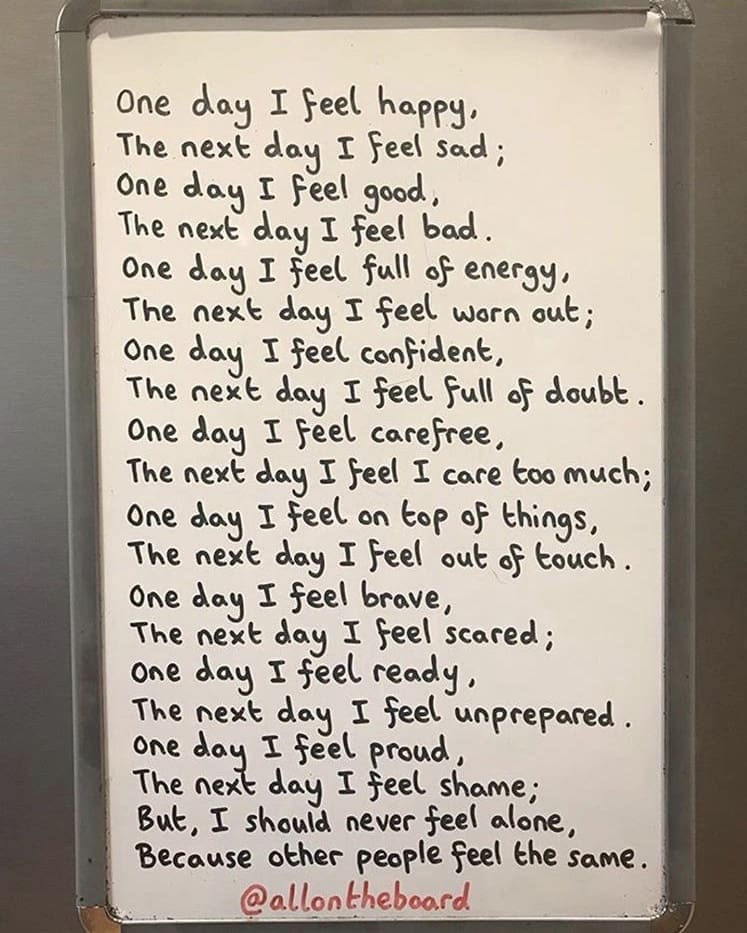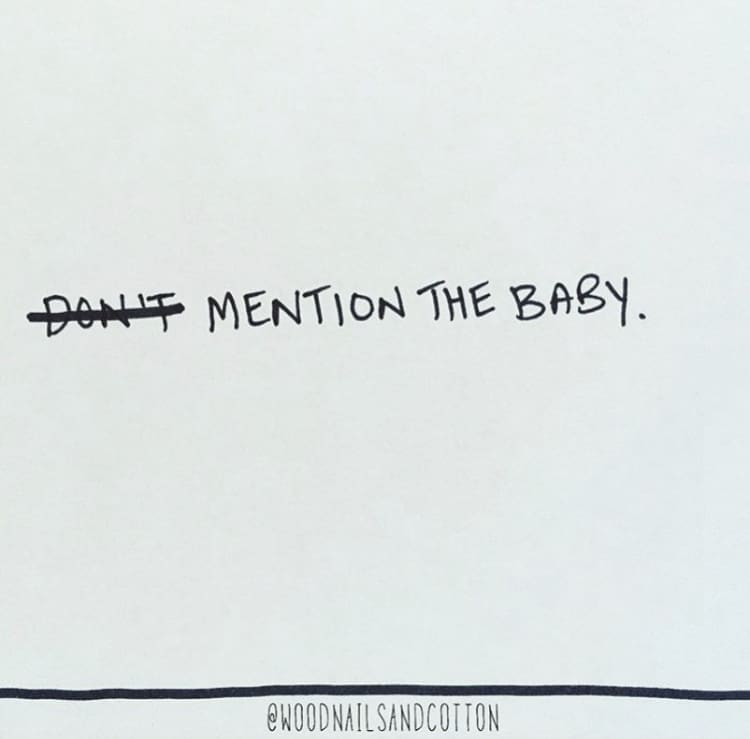I was in the work bathroom one day in my late 20s when I heard a whimper coming from the cubicle next to me. It was followed by one of those guttural sounds that immediately dumps a surge of adrenaline into your blood stream. Clearly something very bad is happening and you must do something, right now.
“Are you okay?” seemed like an utterly redundant question as soon as the words had come out of my mouth. “Can I do anything?” also sounded ridiculous, and still I could hear this person sobbing on the other side of the wall. Finally, I asked, “Can I come in?” and in a very small, frightened voice, a woman’s voice simply replied, “please”.
Getting in wasn’t quite so simple – and I prayed that no one would walk in at that moment as I scaled over the top of the cubicle, where I found a woman I’d seen around at work, but had never spoken to before, folded up in the corner of the large wheelchair accessible cubicle.
I got on the ground with her and put my arms around her and neither of us spoke while she stared ahead, tears silently streaming down her face. Finally the words came out “I’m having a miscarriage.”
She was two days shy of 12 weeks – on the Thursday she was planning on telling everyone: her family, her friends, her boss, her co-workers. Suddenly the future she had mapped out in such exquisite detail had vanished.
Her story came out in whispers and stopped every time the door creaked opened as someone came into the bathroom. Every now and then I felt a pang at the absurdity of the situation – none of those women coming and going, checking their lipstick and hair in the mirror knew of the sorrow and loss that was unfolding right next to them. It all seemed so utterly unfair. I wondered how many times this had happened to other women – suffering a miscarriage alone in the bathroom at work, while everyone buzzed on around them, unaware.

After an eternity, I realised I should be doing something practical to be of help – was there anyone she was friends with at work who knew? Could I go get them? Could I go and tell her boss? Call her family? Help get her home? I noticed she was wearing a wedding ring. “I can go and get my phone so you can call your husband?”
There was no one at work who knew, she said and no friends – only her mother and husband knew. Her mum was overseas, but she should let her husband know. “Oh, I have my phone,” she remembered, fishing it out of her coat pocket, before dissolving into tears again. “I can’t tell him,” she shivered, putting the phone in my hands and asking if I could do it – if I could be the one to tell him what happened and to ask him to pick her up.
I crept out into an empty meeting room nearby and crouched in the dark, pushing go on the call. To this day I’ll never forget the warm, “hey babe” he answered the phone with, so genuinely pleased to hear from his wife. Nor will I forget the silence when I explained who I was and why I was calling. Then he cleared his throat, and moved into practical mode, asking me to please hold on with her, he’d be there in 15 minutes waiting downstairs. Luckily he worked just down the street.
When the ding of the text message came, announcing that he had arrived, I checked the coast was clear so she could get to the lift without running into anyone on the way. When she had gone, I let her boss know she had headed home because of a sudden stomach bug. They barely batted an eyelid. I went back to the bathroom and cried.
I found her husband on Facebook the next day and sent a message to say how sorry I was and hoped they were doing okay. He replied soon after, thanking me for the message, for helping his wife, and that she was very appreciative but hoped I would keep what happened private.
Two days later she was back at work, having bounced back from her stomach flu. I walked past her in the kitchen as she placed a hand on her stomach and replied to someone who had obviously – well-meaningly – asked how she was feeling after the “illness”. “Oh thanks, I’m feeling all better now!” she said. I wanted to scream for her.
We never spoke again – she never even made eye contact with me again, which I fully understood because whenever I saw her, all I could think about was lying on that bathroom floor, so I can only imagine how triggering it must have been for her to see my face.
But I thought of her often in the months that followed, and when she resigned four months later I’d occasionally check in on her Facebook page. I cried happy tears for her when she posted a picture of her newborn baby in her arms about two years later. I looked at the comments and saw a few people saying what a surprise it was, that she’d managed to keep it such a happy secret. I wondered how happy she’d found the experience, about how long she kept it quiet from everyone, about how much she – and her husband – had worried in silence.


Miscarriage and baby loss is a topic so rarely spoken about, which seems such an incredible loss in itself, given that it’s how one in every four pregnancies ends. It seems entirely bizarre and wrong, that something so common could become such a taboo subject.
When Chrissy Teigen shared her pregnancy on Instgram, it was so brave and so refreshing in how she so openly shared what she was going through. When she was ordered on bed rest due to excessive bleeding, she explained why she would now be chatting exclusively from her bed. A few minutes later she popped back up again – apologising, this time talking directly to anyone watching who was also pregnant themselves. “I don’t want anyone to worry, because if I’d been pregnant watching this I would be freaking out,” she said, before going into further detail about what was happening – explaining that she wasn’t just spotting, which is pretty normal during pregnancy, but losing a serious amount of blood. “Believe me, you would know,” she shared.
Pregnancies are often depicted as all fluffiness, cuteness and perfectly curated baby showers and gender reveals, that we can be tricked into thinking everyone else has such a perfect, stressless, wonderful time – which can be incredibly isolating, and terror-inducing. Let alone that next level of isolation that comes when a loss is experienced.
Which is why I thought it was so commendable that Chrissy T showed the true face of that loss, sharing the news of the death of her son Jack, as well as the raw, devastating photos of her family in those moments. I felt outrage bubbling up inside me as I (stupidly) read through some comments online which said what she’d gone through was “too personal” to be shared on Twitter and Instagram. Too personal? If we look at that stat of 1 in 4 pregnancies ending in a loss, we know that a miscarriage is actually anything but personal – it’s a shared grief of so, so many women and men, Every. Single. Day.


Chrissy’s post put a face to that grief and shone a light on a subject that is so often pushed into the darkness and talked about only in hushed voices. I can only imagine how much comfort that must have brought families who are feeling so alone in their grief.
It’s particularly poignant as this week, October 9 – 15 is Baby Loss Awareness Week. It’s a time for parents, families and whanau around NZ to come together and remember the lives of their babies who have died. It’s a time to acknowledge the lives and deaths of all babies, no matter what their gestation, length of life or how they died. It’s a week to remember, and to share your stories. And we hope you will.
Here at Capsule, we hope to bring you a safe space, where your stories are always welcome – if you would like to share your stories, your memories, your experiences, please do. We’d love to hear from you and share those stories with others, if you’d be so generous to allow us to. You can drop me a line at [email protected].
And please, this week, talk to your friends – and support the good folks at Sands who do a remarkable job, supporting the families affected by baby loss.

